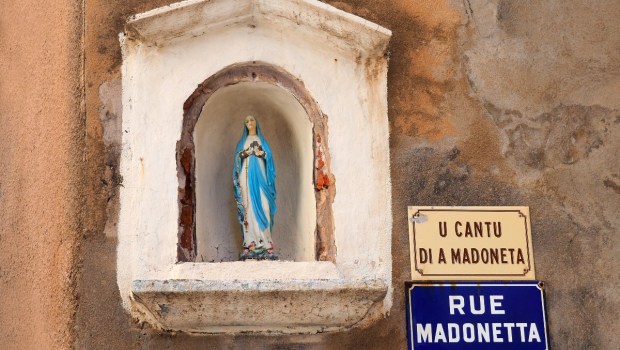Lenten Campaign 2025
This content is free of charge, as are all our articles.
Support us with a donation that is tax-deductible and enable us to continue to reach millions of readers.
“Dio vi salvi Regina” (“Hail, Queen”) is the most famous hymn in Corsica. It pays homage to the Virgin Mary, Madre universale (“Universal Mother”). Sung regularly during processions and religious celebrations, but also on secular occasions such as soccer matches, it’s now considered the Corsican anthem. Who knows how many times it was sung during Pope Francis' recent visit to Corsica on Sunday, December 15.
Corsican polyphonic singing is one of the aspects of popular piety preserved in great part by the island’s famous confraternities. The occasion for the Pope’s trip to Corsica was precisely the closing of a diocesan-organized event on expressions of popular religiosity.
The origin of the hymn
“Dio vi salvi Regina” was written by a saint — Francis of Geronimo — around 1675. A native of Taranto, Italy, St. Francis of Geronimo was a Jesuit priest. A renowned preacher, he devoted the 40 years of his ministry to preaching in the public squares of Naples. He worked on behalf of the sick, workers, and vagrants, earning him the title of “Apostle of Naples.”
He was the author of the Marian hymn “Dio vi salvi, Regina,” inspired by the well-known “Salve Regina” (“Hail Holy Queen”). He wrote it in Italian around 1675. In 1681, the work was printed in Christian doctrine explained in verse, then by the Archbishop of Genoa, Giambattista Spinola, in 1704 in his Summary of Christian doctrine.
On January 30, 1735, it was adopted as the national anthem at Corsica's First Declaration of Independence in the town of Corte, to ask for the Virgin's protection. In 1762, the final verse was added, directly in the Corsican language, and refers to the “enemies” of independence.
Although it takes on a different meaning from the original version, it remains a song that celebrates the gentle maternity of the Virgin Mary, while imploring the heavenly Mother to bring joy and comfort here below.
In Corsican (translation follows):
Dìu vi salvi, Regina
È Matre universale,
Per qual favor si sallì
À u paradisu.
Per qual favor si sallì
À u paradisu.Voi site gioia è risu
Di tutti i scunsulati,
Di tutti i tribulati
L'ùnica speme.
Di tutti i tribulati
L'ùnica speme.À voi suspira è geme
Lu nostru afflittu core
In un mar di dulore
È d'amarezza.
In un mar di dulore
È d'amarezza.Marìa, mar di dulcezza,
Li vostri ochji pietosi,
Materni ed amurosi,
À noi vulghjite.
Materni ed amurosi,
À noi vulghjite.Noi mìseri accuglite
Ind'u vostru santu velu.
Lu vostru figliu in celu,
À noi mustrate.
Lu vostru figliu in celu,
À noi mustrate.Gradite ed ascultate,
O Vèrghjina Marìa,
Dolce, clemente è pìa,
L'affetti nostri.
Dolce, clemente è pìa,
L'affetti nostri.Voi dai nemici nostri,
À noi date vittoria
È poi l'eterna gloria
In paradisu.
È poi l'eterna gloria
In paradisu.
In English :
Hail, Queen
And universal Mother
Through whom we rise
To heaven.
Through whom we rise
To heaven.You are the joy and laughter
Of all the disconsolate,Of all the tormented
The only hope.
Of all the tormented
The only hope.To you our afflicted heart
Sighs and groans
In a sea of pain
And bitterness.
In a sea of pain
And bitterness.Mary, sea of sweetness,
Your pious eyes,
Maternal and loving,
Turn towards us.
Maternal and loving,
Turn towards us.Welcome us, unhappy ones,
Under your holy veil.
Your son in heaven,Show unto to us.
Your son in heaven,
Show unto us.Accept and listen,
O Virgin Mary,
Gentle, merciful, and pious,To our tokens of affection.
Gentle, merciful and pious,
To our signs of affection.Over our enemies,
Give us victory
And then eternal glory
In paradise.
And then eternal glory
in heaven.










